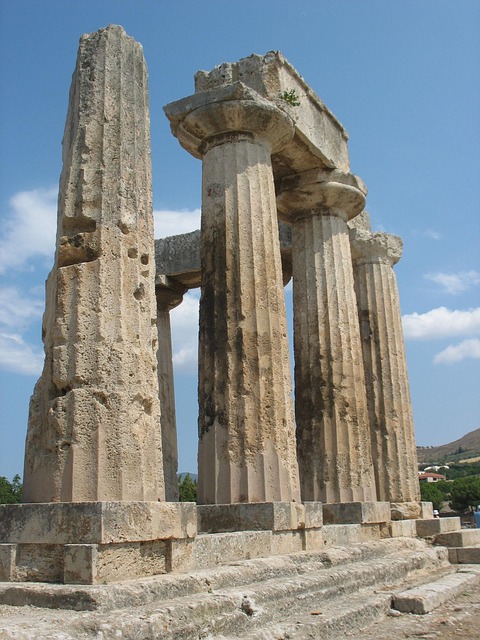« Lusts are fleeting, virtues are imperishable »
Periander of Corinth
Periander of Corinth
Initially, Periander was said to have been a peaceful ruler.
But then, as Parthenius of Nicaea reported, an incident occurred that completely transformed his character. Periander's mother, Cratea, is said to have fallen in love with him and sneaked up to him in the dark of night, seduced him, and disappeared again before sunrise. Thus, Periander's identity remained hidden for a time. But after a while, when his mother lay down with him again, he lit a lamp and discovered that his mother was his lover. He was so enraged that he initially wanted to kill her. Even though he let her live, he began to massively transform into a violent and cruel ruler.
But then, as Parthenius of Nicaea reported, an incident occurred that completely transformed his character. Periander's mother, Cratea, is said to have fallen in love with him and sneaked up to him in the dark of night, seduced him, and disappeared again before sunrise. Thus, Periander's identity remained hidden for a time. But after a while, when his mother lay down with him again, he lit a lamp and discovered that his mother was his lover. He was so enraged that he initially wanted to kill her. Even though he let her live, he began to massively transform into a violent and cruel ruler.



Periander was considered the prototype of the tyrant, tough but
far-sighted. Under his rule, Corinth developed into an economic and
cultural flourishing. He allegedly planned the Corinth Canal, created a
powerful fleet, and, through extensive trade and military successes
(conquest of Epidaurus, Corcyra), ensured Corinth's greatest prestige in
antiquity. His legislative successes included the allocation of land to
poor peasants, employment creation measures, luxury laws, and the
prohibition of slavery. In the dispute between Mytilene and Athens over
Sigeion, Periander was appointed as a judge. He decided the dispute in
favor of Athens. Periander of Corinth – the governor with the
paradoxical record. In detail:
Periander is usually dated to the 7th century BC, sometimes more precisely to the period around 625–585 BC. He was one of the earliest and longest-serving rulers of the Corinthian tyranny and acted during a period in which Greece was moving from lawless developments to more centralized forms of power.
Periander came from Corinth, one of the richest and strategically most important cities in Greece, located directly on the Isthmus of Corinth. The ancient sources suggest that he was part of a dynastic rule that consolidated Corinth politically and, at the same time, was subject to the expectations of prudent, often strict governance. Concrete information on a formal "education" in the modern sense is lacking; rather, it can be said that Periander matured as a ruler during a time of great political practice: He learned political art, diplomacy, the balance of power, and the art of using resources to create stability. His upbringing may have been strongly influenced by the royal or tyrannical tradition of his city, in which leadership through fear, order, and economic rigor were considered virtues.
He ruled Corinth during an era often referred to as the beginning of tyrannical rule in Greece. His reign is characterized by a mixture of economic prosperity, strong centralization, and strict legislation. Under his leadership, Corinth experienced a golden age of trade and infrastructure. Reports speak of a tight administration aimed at making Corinth the economic center of the Peloponnese. At the same time, his name is also associated in the sources with cruel or ruthless measures intended to ensure stability and order—an ambivalent record that makes Periander one of the most controversial figures in Greek governance.
Periander is known more as a pragmatic statesman whose teachings result from the experience of political practice. Greek tradition often emphasizes the tension between efficiency, power, and humanity, which Periander may reflect: how much severity is necessary to maintain order, and at what price freedom and loyalty are bought. His reputation as a "tactical" ruler shows how political wisdom can also lie in the implementation of measures – not just in philosophical reflection, but in concrete action intended to ensure the functioning of a city.
Periander is counted among the Seven Sages because he is accorded a place in ancient collections as one of the formative figures of early Greek state leadership. This classification is based less on written works than on the transmission of teachings, ways of life, and the role he played in the political culture of his time. In the collections and chronicles, he is often seen as a representative of a determined, order-oriented statecraft, which brings both positive impulses for growth and potential dangers through authoritarian tendencies. Thus, Periander is seen as a kind of bridge between economic strength, political power, and moral reflection – a figure whose work was considered instructive in the memory of the Greeks.
Conclusion:
Periander of Corinth remains a complex figure: a ruler who made Corinth economically strong and at the same time enforced a rigorous, sometimes fearsome political order. His classification among the Seven Sages is based on the traditional interpretations of ancient authors, who saw in him an exemplary combination of statecraft and moral responsibility. The legend of Periander continues to inspire reflection on the right measure of power, the costs of political action, and the balance between stability and freedom.
Note: There are also lists of the Seven Sages in which instead of Periander, the following sage is named: Mysion (Myson of Chenai, also as Myson of Chen or mention forms). Mysion (Myson of Chenai; also Myson of Chen) was, according to ancient sources, a Greek philosopher; he is often considered a contemporary of Solon and other early statesmen, but concrete biographical data are lacking. Mysion appeared as one of the names in some of these lists, presumably due to his supposedly wise counsel, his political or social influence, or simply due to literary tradition that connects him with wise sayings or principles.
Periander is usually dated to the 7th century BC, sometimes more precisely to the period around 625–585 BC. He was one of the earliest and longest-serving rulers of the Corinthian tyranny and acted during a period in which Greece was moving from lawless developments to more centralized forms of power.
Periander came from Corinth, one of the richest and strategically most important cities in Greece, located directly on the Isthmus of Corinth. The ancient sources suggest that he was part of a dynastic rule that consolidated Corinth politically and, at the same time, was subject to the expectations of prudent, often strict governance. Concrete information on a formal "education" in the modern sense is lacking; rather, it can be said that Periander matured as a ruler during a time of great political practice: He learned political art, diplomacy, the balance of power, and the art of using resources to create stability. His upbringing may have been strongly influenced by the royal or tyrannical tradition of his city, in which leadership through fear, order, and economic rigor were considered virtues.
He ruled Corinth during an era often referred to as the beginning of tyrannical rule in Greece. His reign is characterized by a mixture of economic prosperity, strong centralization, and strict legislation. Under his leadership, Corinth experienced a golden age of trade and infrastructure. Reports speak of a tight administration aimed at making Corinth the economic center of the Peloponnese. At the same time, his name is also associated in the sources with cruel or ruthless measures intended to ensure stability and order—an ambivalent record that makes Periander one of the most controversial figures in Greek governance.
Periander is known more as a pragmatic statesman whose teachings result from the experience of political practice. Greek tradition often emphasizes the tension between efficiency, power, and humanity, which Periander may reflect: how much severity is necessary to maintain order, and at what price freedom and loyalty are bought. His reputation as a "tactical" ruler shows how political wisdom can also lie in the implementation of measures – not just in philosophical reflection, but in concrete action intended to ensure the functioning of a city.
Periander is counted among the Seven Sages because he is accorded a place in ancient collections as one of the formative figures of early Greek state leadership. This classification is based less on written works than on the transmission of teachings, ways of life, and the role he played in the political culture of his time. In the collections and chronicles, he is often seen as a representative of a determined, order-oriented statecraft, which brings both positive impulses for growth and potential dangers through authoritarian tendencies. Thus, Periander is seen as a kind of bridge between economic strength, political power, and moral reflection – a figure whose work was considered instructive in the memory of the Greeks.
Conclusion:
Periander of Corinth remains a complex figure: a ruler who made Corinth economically strong and at the same time enforced a rigorous, sometimes fearsome political order. His classification among the Seven Sages is based on the traditional interpretations of ancient authors, who saw in him an exemplary combination of statecraft and moral responsibility. The legend of Periander continues to inspire reflection on the right measure of power, the costs of political action, and the balance between stability and freedom.
Note: There are also lists of the Seven Sages in which instead of Periander, the following sage is named: Mysion (Myson of Chenai, also as Myson of Chen or mention forms). Mysion (Myson of Chenai; also Myson of Chen) was, according to ancient sources, a Greek philosopher; he is often considered a contemporary of Solon and other early statesmen, but concrete biographical data are lacking. Mysion appeared as one of the names in some of these lists, presumably due to his supposedly wise counsel, his political or social influence, or simply due to literary tradition that connects him with wise sayings or principles.